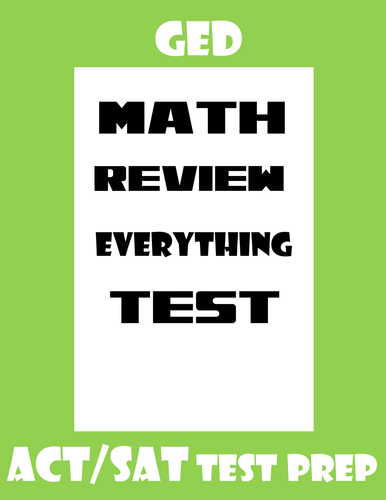
This assessment is completely Common Core aligned to adult ed curriculum. There are multiple questions for each topic, so when you need an assessment in a flash, there will be one to choose from. Better yet, it is fun for the adult learner.
Topics include:
Number & Operations
-Understand numbers, ways of representing numbers, relationships among numbers, and number systems.
Algebra
-Understand patterns, relations, functions
-Represent and analyze mathematical situations and structures using algebraic symbols
-Use mathematical models to represent and understand quantitative relationships.
-Analyze change in various contexts.
Geometry
-Analyze characteristics and properties of 2 and 3 dimensional shapes and develop mathematical arguments about geometric relationships.
-Specify locations and describe spatial relationships using coordinate geometry and other representational systems.
-Apply transformations and use symmetry to analyze mathematical situations.
-Use visualization, spatial reasoning, and geometric modeling to solve problems.
Measurement
-Understand measurable attributes of objects and the units, systems, and processes of measurement.
-Apply appropriate techniques, tools and formulas to determine measurement.
Data Analysis and Probability
-Formulate questions that can be addressed with data and collect, organize, and share relevant data to answer them.
-Select and use appropriate statistical methods to analyze data.
-Develop and evaluate inferences and predictions that are based on data.
-Understand and apply basic concepts of probability.
Process
-Problem-solving
-Reasoning and proof
-Communication
-Connections
-Representation
Topics include:
Number & Operations
-Understand numbers, ways of representing numbers, relationships among numbers, and number systems.
Algebra
-Understand patterns, relations, functions
-Represent and analyze mathematical situations and structures using algebraic symbols
-Use mathematical models to represent and understand quantitative relationships.
-Analyze change in various contexts.
Geometry
-Analyze characteristics and properties of 2 and 3 dimensional shapes and develop mathematical arguments about geometric relationships.
-Specify locations and describe spatial relationships using coordinate geometry and other representational systems.
-Apply transformations and use symmetry to analyze mathematical situations.
-Use visualization, spatial reasoning, and geometric modeling to solve problems.
Measurement
-Understand measurable attributes of objects and the units, systems, and processes of measurement.
-Apply appropriate techniques, tools and formulas to determine measurement.
Data Analysis and Probability
-Formulate questions that can be addressed with data and collect, organize, and share relevant data to answer them.
-Select and use appropriate statistical methods to analyze data.
-Develop and evaluate inferences and predictions that are based on data.
-Understand and apply basic concepts of probability.
Process
-Problem-solving
-Reasoning and proof
-Communication
-Connections
-Representation
Something went wrong, please try again later.
This resource hasn't been reviewed yet
To ensure quality for our reviews, only customers who have purchased this resource can review it
Report this resourceto let us know if it violates our terms and conditions.
Our customer service team will review your report and will be in touch.
$3.00
